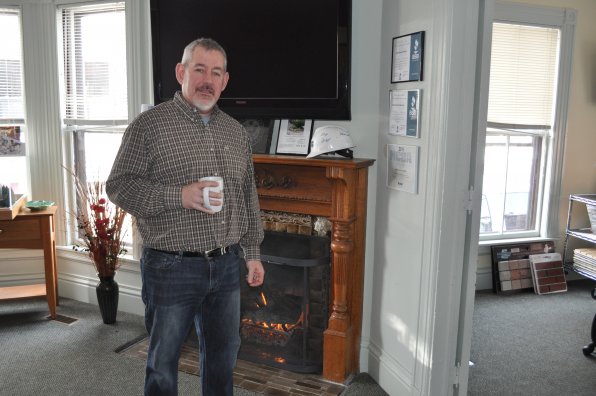Name: Jonathan Halle
Warrenstreet Architects
What made you decide to become an architect?
I got kind of an awkward start. I went to UNH for a semester, I went to the Tech for a year. I was actually an electrical engineering major, and then I took some time off and worked construction. I had a friend that was in the architecture program, the two-year program, at the Tech. I enrolled there for one semester, and then I stopped and said, “You know what, I want to go the full length.” So I applied to Roger Williams into their program and basically put myself through school from there. I’ve been licensed since September 1990. And fast forward 23 years, I just got licensed as a landscape architect.
What makes Warrenstreet a unique firm?
With our practice, the culture is very different. We are an employee-owned co-op, and we believe it to be the first employee-owned design cooperative in the country. You have to have worked in your position for seven years and have to have been employed with Warrenstreet for three years before you become eligible. It’s $25,000 to own one share, and you have one vote. Everyone has one share. Honestly, as a culture, people are invested in themselves. The whole idea here is that this business continues, that we bring in young, fresh, talented people that are interested in having control of their own destiny and coming to work for themselves.
Who is an architect whose work you admire?
New Hampshire is a very small market, but you’ve got architects like Chris Williams, who does really phenomenal residential, large-scale homes in the Lakes Region.
Any buildings in Concord that you admire?
There’s a real legacy and heritage of beautiful buildings here. You look at the State House, or the insurance company right across from the Walker School building that has a statement from a real particular period. And then you have the architecture of Main Street, which is absolutely gorgeous and just screaming to be restored. The idea of what they are doing on Main Street, the principle behind it and the commitment is just phenomenal.
What have you designed that you are most proud of?
My proudest accomplishment is the New Hampshire State Veterans Cemetery in Boscawen. That started in 1992 when we did the first phase, and we’ve done a number of memorials there. All of the service disciplines have built a number of monuments in there. We did the Marine monument, and last year, pro bono, we did a monument for the Army.
What is the Holy Grail of architecture, to you?
When I got out of school in 1985, I spent five months walking around Europe. You can name all sorts of buildings, but I think the biggest impact I’ve had in terms of architecture is going through Italy and seeing people living and literally hanging their laundry on stuff that is thousands of years old; they live in buildings that are 800 years old. In our country, 200 years old is ancient. It’s just a different perspective. You walk through the little villages and towns in Europe, and just the heritage and how long that’s been around, I think that’s the biggest impact.
People often first associate architecture with drawing buildings. What are some other key skills of an architect?
From our perspective, the biggest piece we have is that an architect is more of a facilitator of relationships, and is really an advisor. Building a building and making it pretty and all of that is pretty easy to do, but today people are looking for green buildings and energy-conscious design. There’s always issues of cost and how do you get it built. What we bring to the table is the ability to bring people together, talk about options and really try to explore what the best solution is, whether it’s a bus stop or a building – how do you go about arriving at a consensus, so you’re client understands how you got from A to B. If you work with schools, you start a design with one school board, build it with another, and then the occupancy, four or five or six years later, is with another board that doesn’t remember why you did what you did when you started to design something.
What would be a dream project for you to work on?
In Concord, if there was a way to tie downtown to the river, that would be extremely cool.
Did you design your own home? Are you constantly tinkering and redesigning parts of it?
I did do my own house. It’s a timber frame, kind of rustic. And yeah, it’s been seven years – it’s not done yet. My wife and I are talking about changing the counters in the kitchen now. But it’s fun.
If you were to design a sweet downtown office for the Insider, what would it be?
I think it would be cool if it was a funky little space that was accessible to the downtown, so people could just walk in. There’s a lot of characters in Concord. And that way you’d see and hear a lot of things when you went out for coffee or something like that.
If you weren’t an architect, what would you be doing?
If I wasn’t an architect, I’d be a veterinarian. Animals don’t talk back.
Guilty pleasure?
I have two horses. They are incredible animals that teach me something every day.









